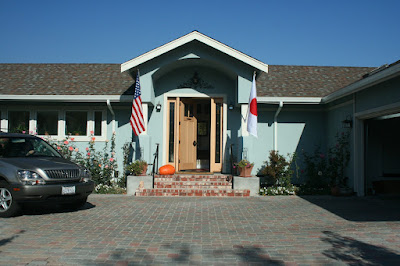This, I guess, is what Germany is all about.
It is beautiful, and sad, at the same time. Hmmm.
Friday, October 26, 2007
Thursday, October 25, 2007
Wednesday, October 24, 2007
I'm Feeling Nostalgic
Tuesday, October 23, 2007
Mazal Tov!

We got back safely from our weekend attendance at the sister's family wedding in Ft. Lauderdale FL. Lauderdale is warm, warm, warm. Temperature 88, humidity 88. Salt shaker at the sidewalk cafe was 2/3 rice, and 1/3 salt. . .and it didn't work. Hey, that's Florida

(That's the sidewalk cafe, in front of the hotel.)
We stayed at the historic Riverside Hotel, nee 1932 or thereabouts. Contrary to the street appearance, we were on the 11th floor of the new tower, with a stunning view of the New River and the high-rise condos that define both riverbanks.

Our guide took us on a whirlwind tour of Miami, Biscayne Bay, South Beach, etc., etc. Miami is a big place, about 60% Spanish-speaking, and not very friendly to the tourist except along the beach. We prefer Ft. Lauderdale.

Mieko and her sister did, however, visit the very steps where Versace was gunned/knifed or otherwise induced to assume room temperature (which in his case was 88 Fahrenheit) a few years ago.

The wedding went well. Lot's of traditional Jewish elements with appropriate responses. I'm always pleased when the rabbi has a good singing voice. May the young couple have a full and productive life together.

Thursday, October 18, 2007
German Vocabulary
Tuesday, October 16, 2007
Rocks, Rocks, Stones, & More Rocks
Germany is full of rocks. The buildings are made of rocks, the streets are made of rocks, the sidewalks are made of rocks.

German cities have been utterly destroyed by wars about every 400 years or so for about forever. I figure that's where they get all the rocks. They're left over after the war, and you have to gather them up and do something with them.

The walls, turrets, and towers of all the castles and fortresses are made of rocks. They were designed to foil enemy attacks. Sometimes, the builders got pretty creative with their rock designs.

In Dresden, capital of Saxony, formerly in East Germany, the city government has made heroic attempts to rebuild all the rock/stone monuments. It's impressive, of course, but ultimately somewhat depressing.
(Come to think of it, I found Germany somewhat drepressing.)


German cities have been utterly destroyed by wars about every 400 years or so for about forever. I figure that's where they get all the rocks. They're left over after the war, and you have to gather them up and do something with them.

The walls, turrets, and towers of all the castles and fortresses are made of rocks. They were designed to foil enemy attacks. Sometimes, the builders got pretty creative with their rock designs.

In Dresden, capital of Saxony, formerly in East Germany, the city government has made heroic attempts to rebuild all the rock/stone monuments. It's impressive, of course, but ultimately somewhat depressing.
(Come to think of it, I found Germany somewhat drepressing.)

Monday, October 15, 2007
Factlets (cont'd)
Did you know that Florida is flatter than Washington D.C.? By 64 feet? Flatter being defined as the change in elevation between the highest point and the lowest. Just go to:
http://en.wikipedia.org/wiki/List_of_U.S._states_by_elevation#Listed_by_elevation_difference
Who knew?
http://en.wikipedia.org/wiki/List_of_U.S._states_by_elevation#Listed_by_elevation_difference
Who knew?
Friday, October 12, 2007
Vertical Weingut
"Weingut" means a wine estate; the vineyards, cellars, and production facilities of a winery. Along the Rhein river, the wineries plant the vines straight up the slopes on both sides of the river, "to make the vines work harder to get water, thus making richer, sweeter grapes." At places they actually string ropes up the steep hills between the rows of grapes in order to facilitate pruning and picking.
The vineyard workers come mostly from Poland, on short labor contracts, and return home when the work is done. All legally. Hmmmmm.

Many of the vineyards have only a few hectares of hillside planted, but their owners appear to know every square inch of each hill, the type of soil, and the qualities of the rocks that reside therein.

During our visit, the sun was shining brightly, and the vines were soaking up the rays. The locals, quite unused to the bright sun, did likewise.

Upon learning that we were from California, most often they thanked us profusely for bringing our sunshine with us.
Bitte zehr!
The vineyard workers come mostly from Poland, on short labor contracts, and return home when the work is done. All legally. Hmmmmm.

Many of the vineyards have only a few hectares of hillside planted, but their owners appear to know every square inch of each hill, the type of soil, and the qualities of the rocks that reside therein.

During our visit, the sun was shining brightly, and the vines were soaking up the rays. The locals, quite unused to the bright sun, did likewise.

Upon learning that we were from California, most often they thanked us profusely for bringing our sunshine with us.
Bitte zehr!
Wednesday, October 10, 2007
Our Guide To Deutschland
Tuesday, October 09, 2007
Our European Sports Adventures
First, we tried our hands at skittles, a hugely-popular pub game in Worcestershire. This photo was taken at the Great 2007 English Cheese Festival and Exposition (or something like that.)

Then we visited the Old Course at St. Andrews, the home of golf. The ghost of Bobby Jones haunted our visit. It was moving.

Not a bit bad experience.

Then we visited the Old Course at St. Andrews, the home of golf. The ghost of Bobby Jones haunted our visit. It was moving.

Not a bit bad experience.
Monday, October 08, 2007
PaddleWheeling Down (Up?) The Rhein
Subscribe to:
Posts (Atom)





